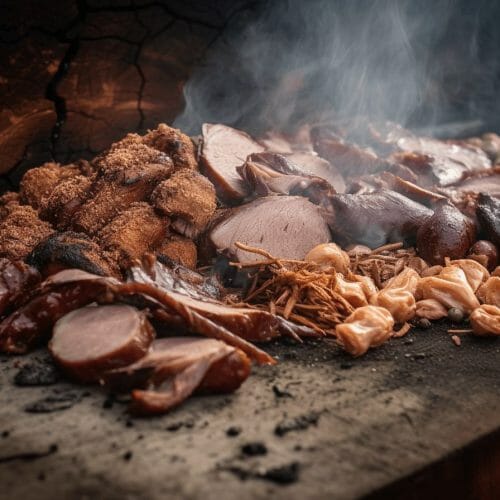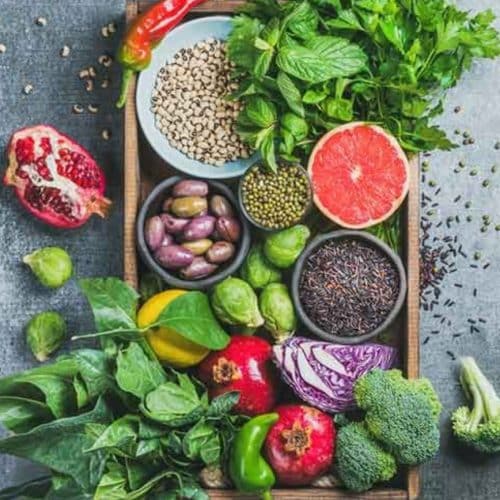Key Highlights
- Eating late can lead to weight gain, primarily because it often involves consuming extra calories beyond your daily needs.
- The habit can disrupt your body’s internal clock, or circadian rhythm, affecting how you process calories.
- For some, it’s a symptom of night eating syndrome, a recognised eating disorder that requires professional attention.
- Lying down after a meal increases the risk of digestive issues like acid reflux.
- Nighttime food intake can negatively impact your blood sugar levels and overall sleep quality.
It’s 11:45 p.m., your stomach growls, and that bag of chips suddenly calls your name. We’ve all been there.
But late-night snacking isn’t always harmless. It can disrupt sleep, affect metabolism, and sometimes point to a bigger issue like Night Eating Syndrome (NES).
This article will help you understand what happens when you eat after dark, and how to break the cycle for good.
What Is Night Eating Disorder?
Night Eating Syndrome (NES) isn’t just about late-night cravings; it’s when the quiet hours turn into moments of emotional eating, with much of your day’s calories consumed long after the world has gone to sleep.
This can happen after your evening meal or by waking up during the night, specifically to eat.
Unlike other eating disorders, NES is characterised by being fully aware during these nighttime eating episodes. The diagnostic criteria often include a lack of appetite in the morning and a belief that you need to eat to fall or stay asleep.
Night Eating Syndrome Causes
People eat late at night for a variety of reasons, ranging from simple habit to underlying psychological factors. Your daily routine and emotional state can significantly influence your evening hunger levels and food intake.
Sometimes, the cause is as simple as not eating enough during the day. This can lead to extreme hunger in the evening, creating a cycle of overeating at night and then being too full for breakfast the next morning, which can be exacerbated by factors like seasonal affective disorder.
Other times, the reasons are more complex. Emotional and psychological factors play a major role. Some common triggers include:
- Stress: Stress is known to increase ghrelin, the hunger hormone, especially in the evening.
- Habit: Mindlessly snacking while watching TV or working late can become an ingrained routine.
- Anxiety Disorders: Conditions like major depression and anxiety can be linked to nighttime eating patterns.
- Boredom: Eating can become a way to pass the time when you’re feeling unoccupied at night.
Night Eating Syndrome Symptoms
You deserve peaceful nights, not ones ruled by cravings. Learning to identify the signs of Night Eating Syndrome (NES) can help you understand what your body’s truly trying to tell you and guide you toward balance and rest, which may involve treatments like selective serotonin reuptake inhibitors.
Recognising them early can help you take action and seek the right support.
Here are the main symptoms to look out for:
- Eating a large portion of daily calories after dinner: You might notice that evenings feel like your “real” mealtime, when the day’s stress quiets down, and food becomes a source of comfort or calm. Many people with NES end up eating a quarter or more of their daily calories late at night, often without realising it.
- Waking up to eat during the night: Sleep may be interrupted by a familiar urge; you wake up not because you’re hungry, but because eating has become part of your nighttime routine. These moments can bring brief relief, followed by guilt or frustration in the morning.
- Full awareness during episodes: Unlike sleepwalking, you’re completely aware, turning on the light, choosing what to eat, and remembering it all the next day. That awareness can make the cycle feel even heavier, as you wrestle between control and craving.
- Little or no appetite in the morning: By the time morning comes, your body still feels full or uneasy. Breakfast loses its appeal, and the day begins sluggishly, continuing the cycle of eating later and later.
- Difficulty falling or staying asleep: Sleep might feel impossible without food. You tell yourself a small bite will help you relax, but soon, it becomes a nightly ritual, linking comfort and calories to rest itself.
If these symptoms sound familiar, remember, this is not about lack of control or discipline. Night Eating Syndrome is a treatable condition.
Understanding the Difference Between Late-Night Snacking and Night Eating Syndrome
Late-night snacking is something most of us do: a handful of chips during a movie, a spoonful of peanut butter after work, or a midnight scoop of ice cream. Most of the time, it’s harmless. But when nighttime eating becomes a compulsion rather than a choice, it could signal something deeper, such as Night Eating Syndrome (NES), which is characterised by symptoms of night eating syndrome.
The table below helps you understand how these two patterns differ, in cause, behaviour, and impact, so you can recognise what’s normal and when it might be time to seek help.
| Aspect | Regular Late-Night Snacking | Night Eating Syndrome (NES) |
| Nature | Occasional eating at night, often out of habit or mild hunger. | A recurring, emotionally driven pattern of eating late at night or after waking from sleep. |
| Triggers | Boredom, routine, working late, or light hunger. | Stress, anxiety, poor sleep, or emotional imbalance that triggers a strong urge to eat. |
| Control | You decide to eat and can easily stop. | You feel compelled to eat, even without physical hunger, and struggle to resist. |
| Timing & Frequency | Happens occasionally-sometimes while watching TV or working. | Happens several nights a week, often involving eating after dinner or during sleep interruptions. |
| Type of Food | Usually, light snacks like yoghurt, nuts, or fruit. | Often, carb-rich or sugary foods are linked to comfort or emotional relief. |
| Physical Effects | Minimal impact when occasional; can even stabilise blood sugar if balanced. | May lead to disrupted digestion, poor sleep quality, and weight gain over time. |
| Emotional Impact | Usually neutral; no strong emotions attached. | Often followed by guilt, frustration, or distress about loss of control. |
| Morning Appetite | Normal appetite in the morning. | Little or no appetite after waking due to nighttime eating. |
| Health Risk | Generally low unless it becomes frequent and calorie-dense. | Higher risk of metabolic issues, mood disturbances, and poor sleep patterns. |
| Professional Support | Not usually required unless it becomes habitual and unhealthy. | Guidance from a healthcare provider or therapist is recommended to break the cycle. |
Why Is Eating At Night Bad and What Are Its Health Risks?
Late-night eating may seem harmless, but it can disrupt digestion, sleep, and your body’s natural rhythm. When you eat after your system expects rest, it can affect metabolism, energy, and overall well-being.
Here’s a quick look at the most common issues linked to late-night eating, and how to manage them better.
1. Slower Metabolism
When you sleep, your body’s energy needs decrease and your metabolism slows down. Eating large meals close to bedtime means your body may not process those calories efficiently, especially if your body mass index is on the higher side. Instead, some of that energy gets stored as fat, which can gradually lead to weight gain and affect blood sugar control.
Better choice: Finish dinner at least 2-3 hours before bed. If hunger strikes late, try a light option like warm milk, yoghurt with seeds, or roasted makhana instead of a heavy meal, as heavy eating causes weight gain.
2. Disrupted Body Clock
Your internal circadian rhythm regulates digestion, hunger hormones, and sleep. Late-night eating confuses this rhythm, forcing your body to focus on digestion when it should be resting and repairing. This misalignment can make your metabolism sluggish and disrupt sleep quality, potentially increasing risks for obesity, diabetes, and heart disease.
Better choice: Try to have your last meal before 8 p.m. and eat at consistent times daily to help your body maintain its natural balance.
3. Weight Gain
Most late-night eating adds unnecessary calories, often from high-sugar or high-fat snacks. Because these foods are consumed out of habit or stress, not true hunger, they easily push your daily calorie intake above what your body needs.
Better choice: If cravings hit, start with a glass of water or herbal tea. If you’re still hungry, choose something structured and small, like a banana with nut butter or a handful of nuts.
4. Poor Sleep Quality
Heavy or spicy foods before bed can lead to heartburn, bloating, or discomfort that keeps you from falling asleep, potentially having negative effects on your sleep quality. Sugary snacks can cause blood sugar spikes and crashes, waking you during the night. Poor sleep then increases hunger hormones the next day, creating a cycle of overeating.
Better choice: Have a lighter dinner rich in protein (paneer, lentils), fibre (vegetables), and healthy fats (ghee, olive oil). Avoid caffeine, fried snacks, and sweets after sunset.
5. Blood Sugar Imbalance
Eating late can interfere with insulin sensitivity, making it harder for your body to regulate blood sugar levels. Over time, this may contribute to weight gain or increased diabetes risk.
Better choice: Keep your last meal balanced, include a mix of protein and fibre. If you have diabetes, consult your doctor about a suitable bedtime snack to prevent overnight sugar dips or spikes.
6. Sleep-Related Disorders
Chronic late-night eating may be part of a pattern known as Night Eating Syndrome (NES), often linked to stress, depression, or conditions like restless legs syndrome and irregular sleep. People with NES may wake up to eat or find it difficult to fall asleep without food, which can worsen insomnia and mood issues.
Better choice: If late-night eating feels uncontrollable or emotional, speak to your doctor or a mental health professional. Therapies like CBT and relaxation training can help re-establish healthy habits.
What To Eat At Night for Dinner to Prevent Late-Night Snacking?
We’ve all been there; it’s late, dinner’s done, yet your stomach still asks for “just a little something.” Often, these cravings stem from blood sugar dips, stress, or unbalanced meals, not real hunger. They can also worsen issues like acid reflux (GERD).
A balanced dinner, with protein, healthy fats, and fibre, keeps you full longer and curbs late-night urges. Pair it with regular activity, and you’ll wake up feeling lighter and more refreshed.
1. Lentil and Vegetable Soup
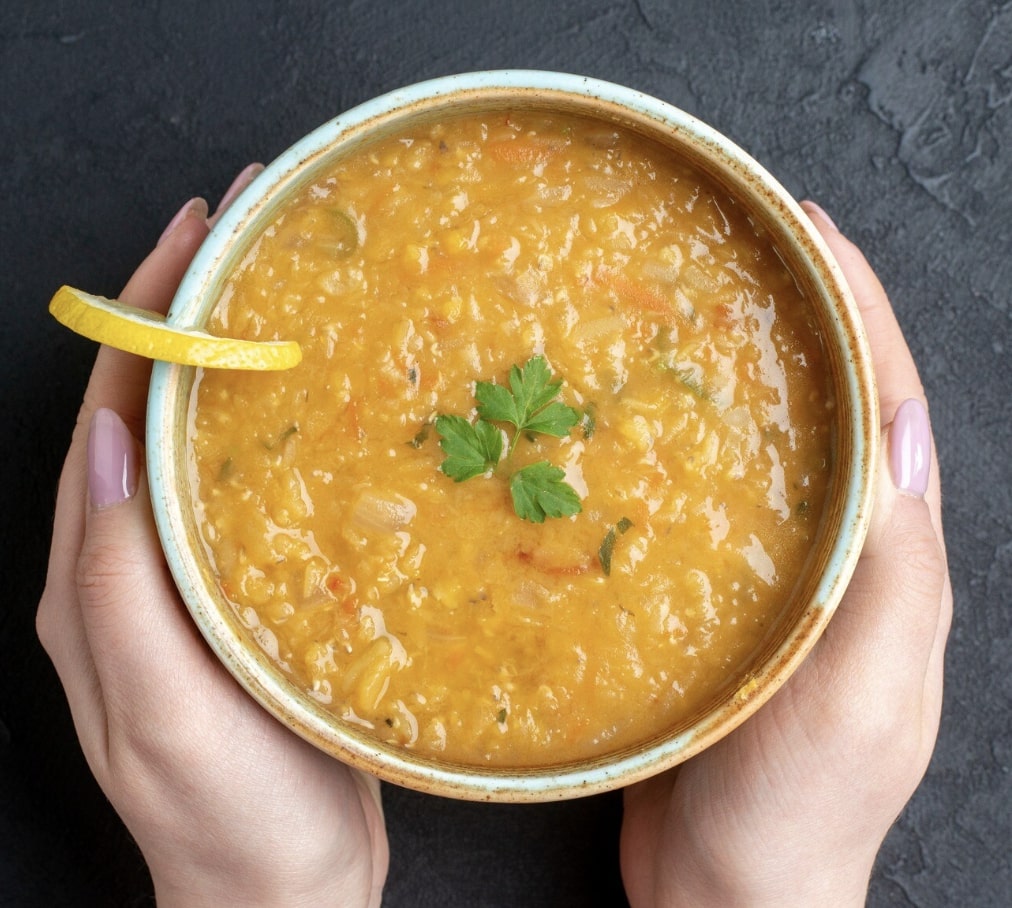
Lentil and vegetable soup in a bowl
Warm, hearty, and full of fibre, lentil soup is one of the most effective dinners for curbing late-night hunger. Lentils provide plant-based protein and complex carbs, while veggies add bulk and nutrients to keep you full longer. A single bowl supports digestion, balances blood sugar, and makes you feel nourished without heaviness.
If you’re craving comfort food that fills you up without leading to midnight snacking, this soup is your best friend.
Recipe:
- Sauté onions, garlic, and carrots in olive oil until soft.
- Add lentils, chopped tomatoes, spinach, and vegetable broth.
- Season with cumin, pepper, and a pinch of turmeric.
- Simmer for 25-30 minutes until thick and creamy.
- Serve warm with a drizzle of olive oil.
2. Grilled Paneer with Quinoa and Veggies
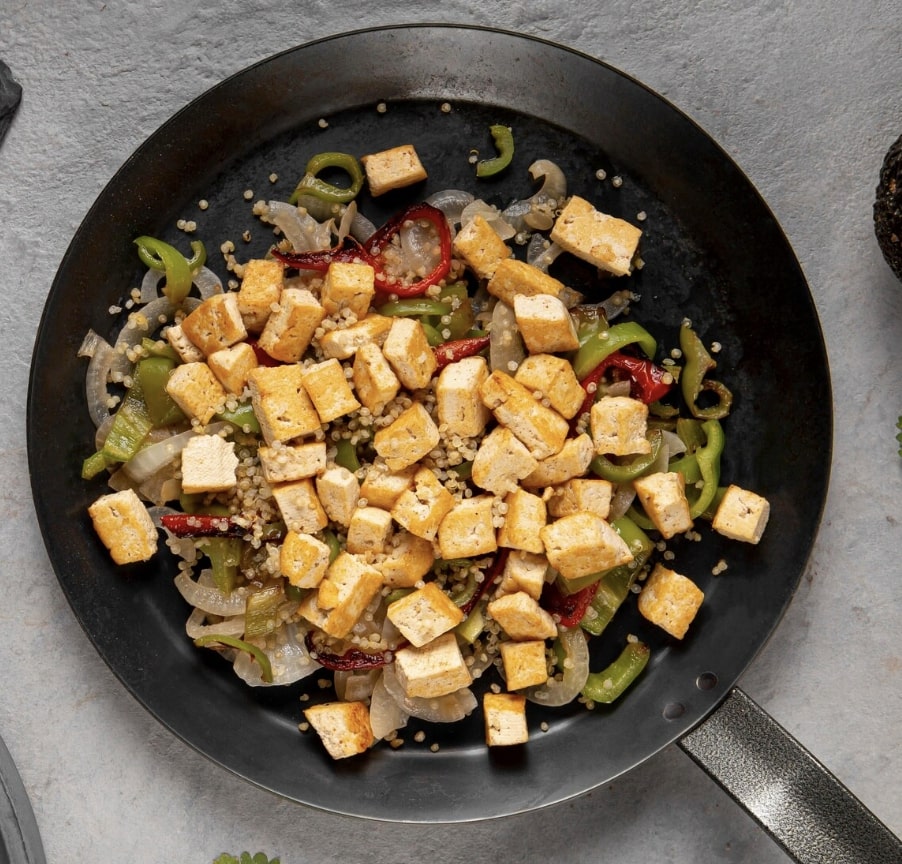
Grilled paneer with quinoa and vegetables
This balanced plate brings together protein, fibre, and healthy fats, the trifecta for staying full. Paneer provides slow-digesting protein, quinoa adds steady carbs, and grilled veggies offer antioxidants that promote calm digestion before bed.
If you’re looking for a dinner that’s light yet deeply satisfying, this paneer-quinoa combo is a keeper.
Recipe:
- Marinate paneer cubes in yoghurt, cumin, and olive oil.
- Grill or pan-sear until golden.
- Cook quinoa with a pinch of salt and toss with sautéed bell peppers, zucchini, and spinach.
- Serve together with a squeeze of lemon and a handful of chopped coriander.
3. Stir-Fried Tofu with Brown Rice

Tofu with brown rice
This quick, high-protein dinner helps fight hunger pangs late into the night. Tofu’s plant-based protein works with brown rice’s complex carbs to create steady energy. A soy-ginger glaze adds flavour while supporting digestion and reducing cravings for salty snacks later.
If you want a wholesome Asian-inspired dinner, this tofu stir-fry is a great choice.
Recipe:
- Sauté cubes of tofu in sesame oil until slightly crispy.
- Add garlic, ginger, soy sauce, and mixed vegetables.
- Stir-fry for 5-7 minutes and serve over warm brown rice.
- Top with sesame seeds and spring onions.
4. Vegetable Khichdi

Vegetable pulao on a plate
Khichdi is India’s comfort bowl for a reason; it’s filling, light on the stomach, and keeps hunger away for hours. Made with rice, lentils, and vegetables, it delivers the right balance of carbs, protein, and fibre. Its slow-digesting nature makes it a perfect dinner to prevent late-night snacking.
If you want something cosy yet nourishing, a warm bowl of khichdi never fails.
Recipe:
- Cook moong dal and rice with turmeric, cumin, and salt.
- Add diced carrots, beans, and peas for extra fibre.
- Pressure cook or simmer until soft and creamy.
- Finish with ghee and fresh coriander before serving.
5. Oats and Vegetable Porridge

Oats and vegetable pulao ingredients
This fibre-rich dinner option helps stabilise blood sugar and prevent late-night sweet cravings. Oats are slow to digest and packed with soluble fibre, while vegetables add vitamins and volume without calories. It’s comfort food that soothes your stomach and supports better sleep.
If you want something gentle yet filling, try this savoury oat porridge for dinner.
Recipe:
- Roast oats in a pan for a minute.
- In a pot, sauté onions, ginger, and vegetables like carrots and spinach.
- Add oats, water (or milk), salt, and pepper.
- Cook until thick and creamy, stirring occasionally.
- Top with ghee or a spoonful of yoghurt.
6. Chickpea Salad Bowl
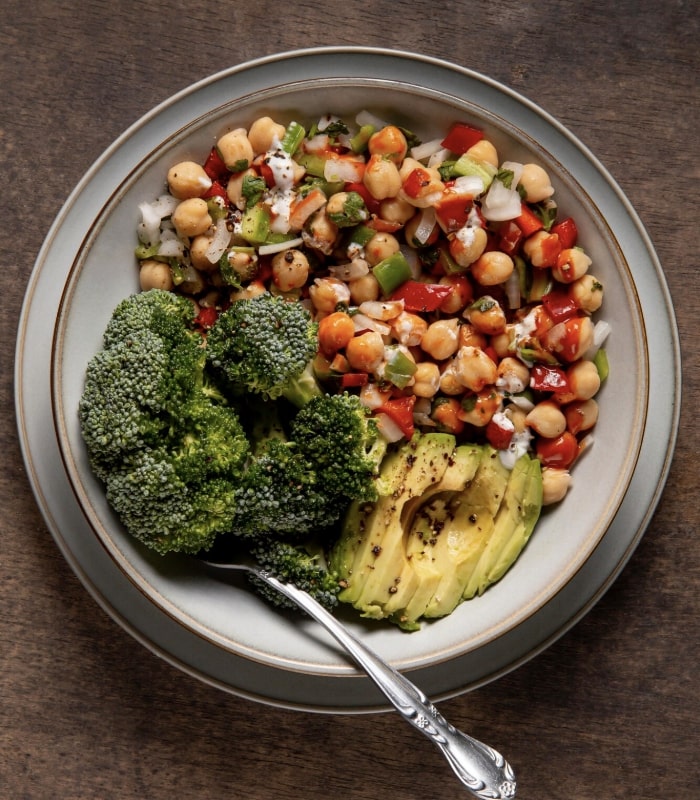
Chickpea salad bowl
Loaded with protein, fibre, and good fats, this chickpea bowl helps beat post-dinner cravings while being light and refreshing. The combination of chickpeas, crunchy veggies, and a drizzle of olive oil creates a complete meal that satisfies without spiking blood sugar.
If you prefer a cold, no-cook dinner option, this salad bowl is ideal for busy nights.
Recipe:
- Combine boiled chickpeas, diced cucumber, tomatoes, bell peppers, and onions.
- Add olive oil, lemon juice, cumin, and salt.
- Toss well and chill for 15 minutes before serving.
- Top with feta or roasted seeds if desired.
7. Baked Salmon with Steamed Vegetables
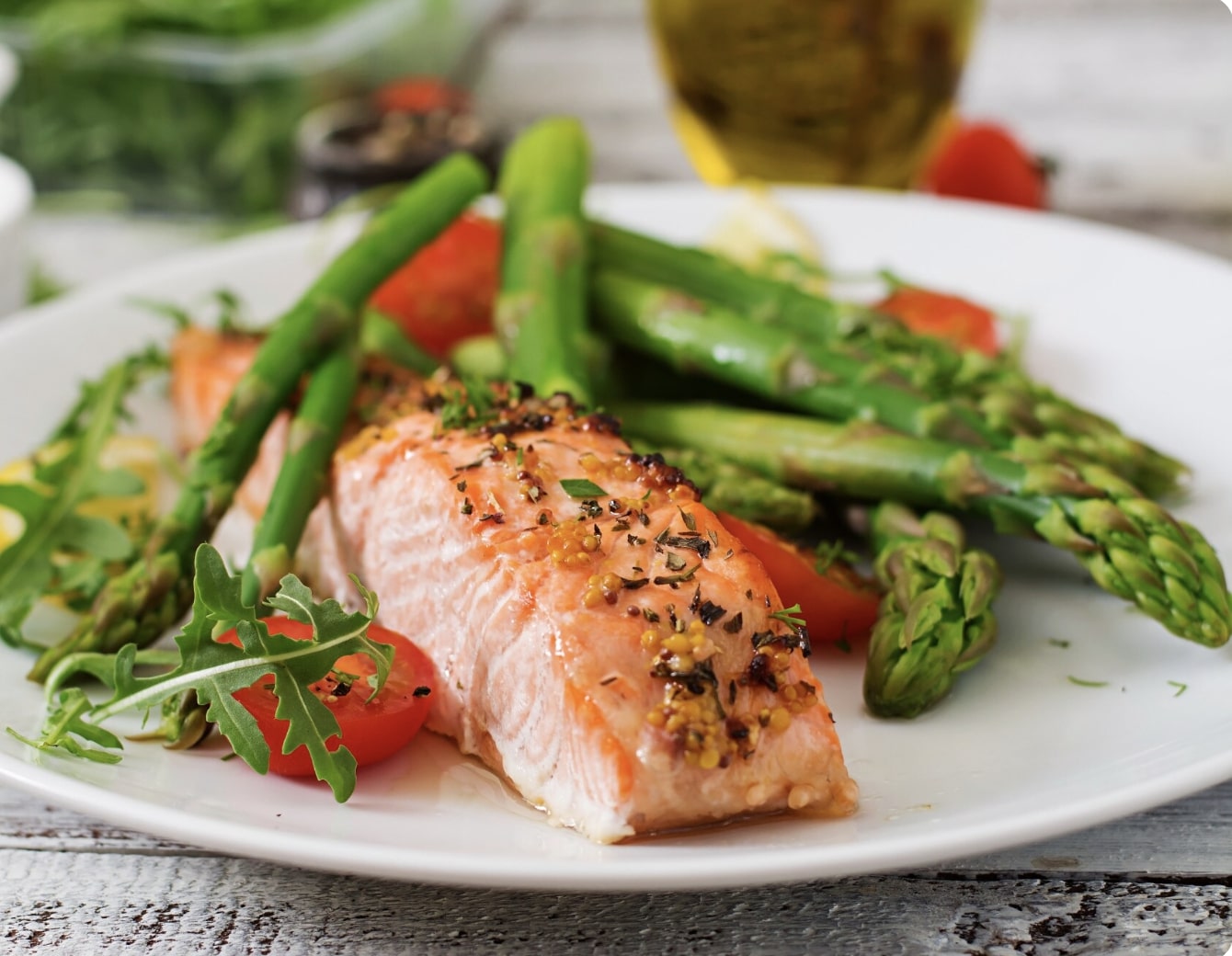
Baked salmon with steamed veggies on a plate
Packed with omega-3 fatty acids and lean protein, salmon helps regulate appetite hormones and supports restful sleep. Paired with fibre-rich steamed vegetables, this dinner ensures steady digestion and satisfaction throughout the night.
If you want a light yet gourmet dinner that keeps you full, this baked salmon is perfect.
Recipe:
- Season salmon with olive oil, salt, pepper, and lemon juice.
- Bake at 200°C for 15 minutes.
- Steam broccoli, carrots, and beans until tender.
- Serve together with a spoon of quinoa or brown rice.
8. Rajma Chawal (Kidney Beans with Brown Rice)
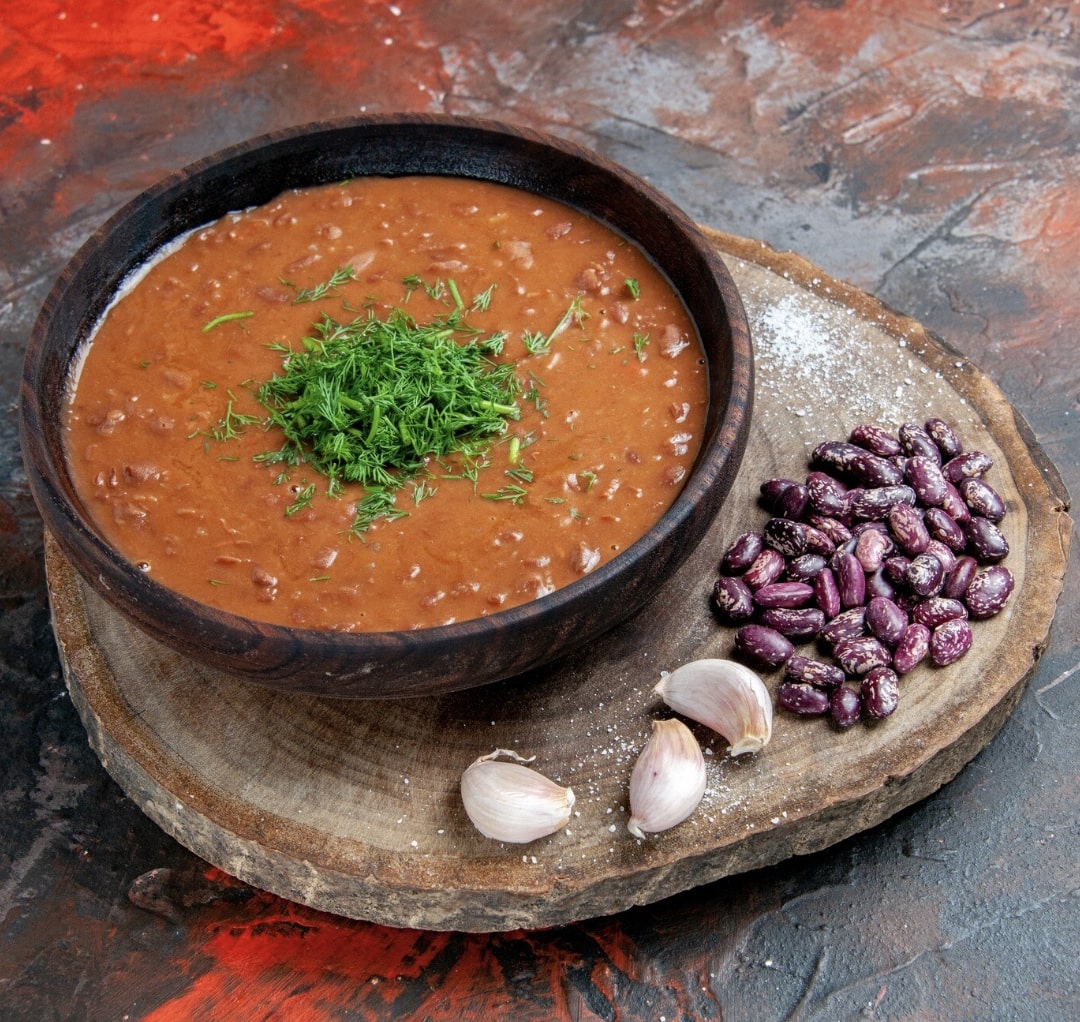
Rajma gravy in a bowl
A high-fibre Indian classic, Rajma Chawal keeps you full for hours thanks to its mix of plant protein, complex carbs, and gut-friendly fibre. The slow-digesting kidney beans promote steady energy and reduce the urge for late-night snacking.
If you want a wholesome Indian meal that satisfies both hunger and heart, go for this version of rajma chawal.
Recipe:
- Pressure cook the soaked kidney beans until soft.
- In ghee, sauté onions, ginger, tomatoes, and spices.
- Add cooked rajma, simmer 10 minutes.
- Serve hot with brown rice and a spoonful of yoghurt.
9. Mixed Vegetable Dalia (Broken Wheat Porridge)
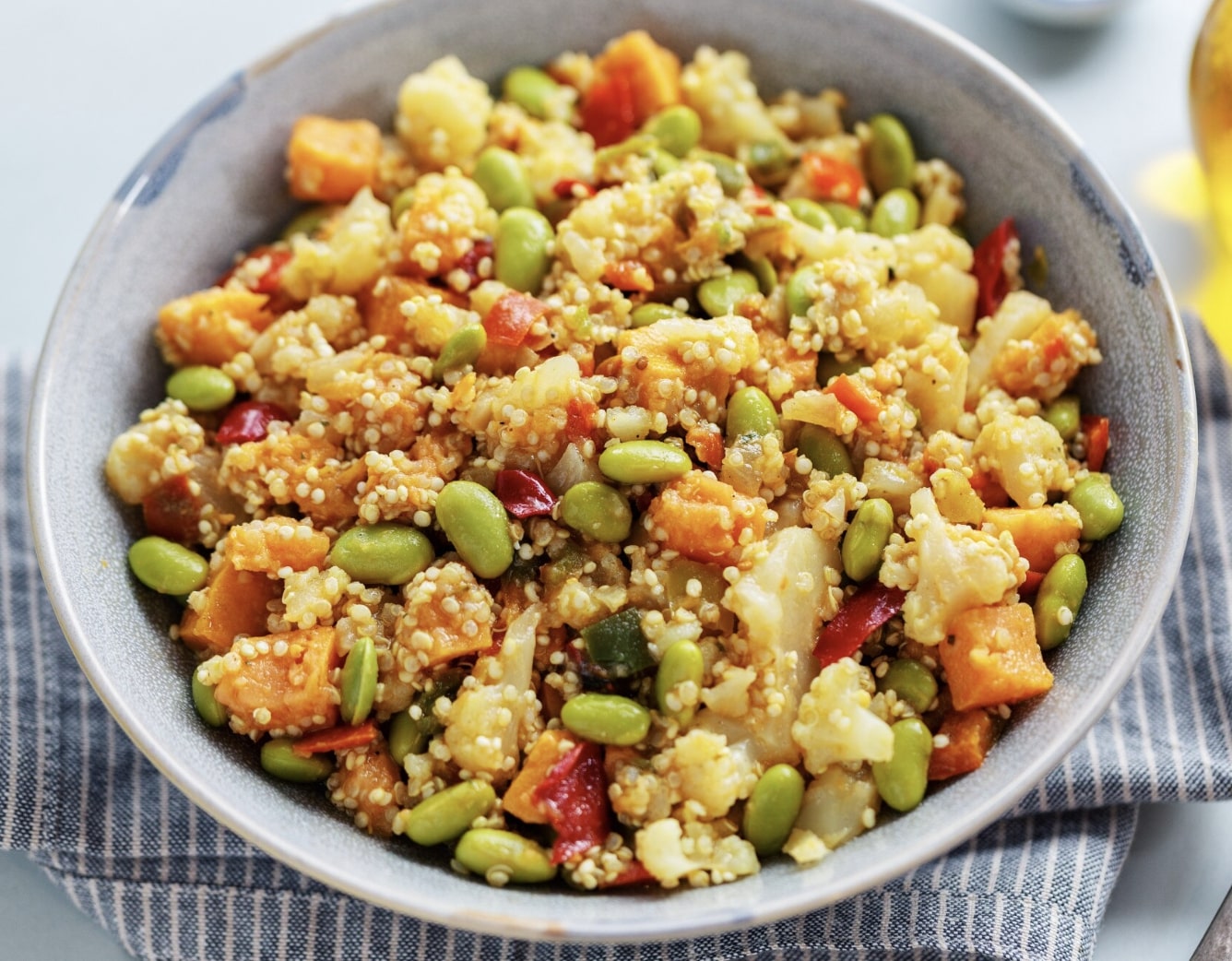
Mixed veg dalia
Nutty, wholesome, and full of fibre, dalia is one of the best dinners for preventing midnight cravings. It digests slowly and keeps blood sugar stable, while vegetables add flavour and nutrition.
If you’re after a one-pot meal that’s hearty but not heavy, dalia fits perfectly.
Recipe:
- Dry-roast dalia until fragrant.
- In ghee, sauté mustard seeds, curry leaves, onions, and veggies.
- Add dalia, water, salt, and cook until soft.
- Garnish with coriander and a squeeze of lemon.
10. Moong Dal Chilla with Mint Yoghurt
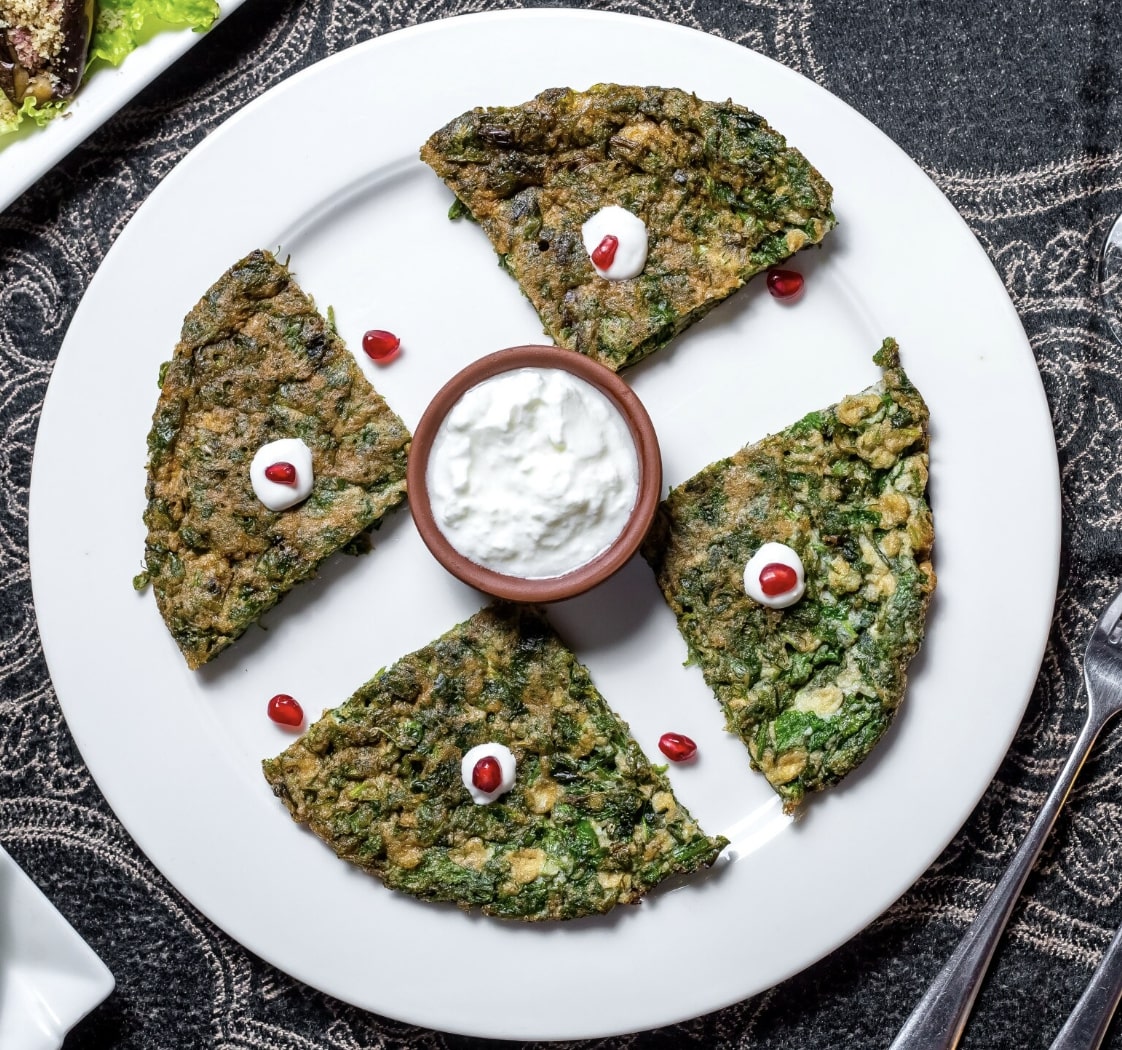
Moong daal chilla with youghurt
These protein-packed savoury pancakes are perfect for a filling yet light dinner. Moong dal offers slow-release energy and fibre, helping you avoid snacking later in the evening. The mint yoghurt dip adds freshness and aids digestion.
If you love crisp, flavorful meals that keep you satisfied, moong dal chilla is a great pick.
Recipe:
- Soak moong dal for 2–3 hours and blend into a smooth batter.
- Add spices, coriander, and onions.
- Pour a ladle on a heated tawa and cook both sides until golden.
- Serve with mint yoghurt or chutney.
Conclusion
While late-night snacks may seem harmless, they can disrupt your metabolism, sleep quality, and even contribute to weight gain and high blood pressure. By recognising the reasons behind your cravings and implementing simple strategies to curb them, you can take charge of your eating habits and promote better health. Remember, prioritising your well-being is a journey, and making small changes can lead to significant improvements.
Frequently Asked Questions
What is the best food to eat at night for health?
If you need to eat before bed, choose a small, nutrient-rich snack. A high-protein option like a handful of almonds or a piece of cheese is a good choice. These foods are better tolerated and less likely to cause a sharp spike in your blood sugar compared to high-carb or sugary junk foods, which can exacerbate insulin resistance.
Can eating at night ever offer benefits?
Yes, for some people, it can. A structured nighttime snack can help manage appetite and prevent overeating later. For individuals with certain health conditions like diabetes, a small snack can help stabilise blood sugar levels overnight, providing a steady energy intake and preventing disturbances in sleep.
How can someone stop the habit of eating late at night?
To stop late-night cravings, focus on your daily habits. Eat regular meals to manage your hunger levels throughout the day. Cognitive behavioural therapy (CBT) can be helpful in adjusting your meal timing and creating a relaxing bedtime routine that doesn’t involve food, which can also significantly improve your habits and overall quality of life.
Best time to eat at night?
The best time to eat at night is about two to three hours before bedtime. This allows your body to digest food properly, and it’s a good idea to do so to reduce bloating, discomfort, and sleep disturbances for better rest.
Why eating at night is bad for you?
Eating at night can interfere with digestion and sleep quality. Your metabolism slows during rest, so excess calories are more likely to be stored as fat, increasing the risk of weight gain and discomfort.
Best time to stop eating at night to lose weight?
To support weight loss and metabolism, stop eating two to three hours before bed, ideally around 7-8 p.m., so your body has enough time to digest food efficiently before sleep.
Is it ok to eat at night?
Yes, it’s okay to eat at night if you’re truly hungry. Choose light, balanced options like yoghurt, fruit, or nuts instead of heavy, fried, or sugary foods that disrupt digestion and sleep.
What happens if you eat too much before bed?
Overeating before bed can cause indigestion, acid reflux, and poor-quality sleep. Your body works harder to digest, which may lead to discomfort, slower metabolism, and potential weight gain over time.










